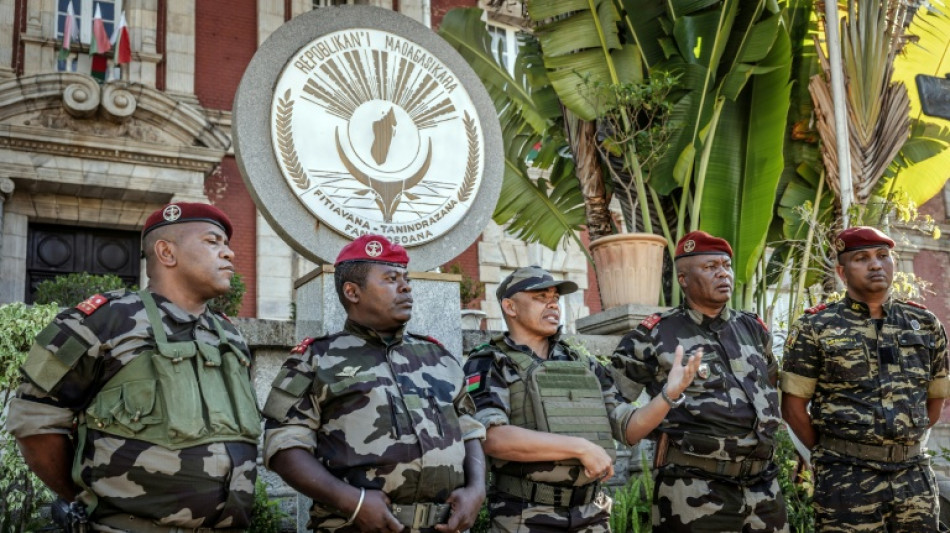
Madagascar's new military leader insists takeover 'not a coup'

Madagascar's Colonel Michael Randrianirina insisted on the eve of his swearing in as new leader on Friday that a military power grab that sent President Andry Rajoelina fleeing the island was "not a coup".
Randrianirina has faced international criticism after his CAPSAT military unit declared on Tuesday it had taken power -- an announcement made moments after parliament impeached Rajoelina.
"A coup is when soldiers enter the presidential palace with weapons. They shoot. There is bloodshed... This is not a coup," he told journalists on Thursday.
In the streets of Antananarivo, the capital of the poverty-stricken Indian Ocean island, there have been celebrations since the dramatic takeover.
Life has regained a semblance of normality after three weeks of barricades and anti-government protests that began on September 25.
The country's highest court was on Friday to officially confirm Randrianirina as "President of the Refounding of the Republic of Madagascar", according to a decree.
The 51-year-old soldier has pledged elections in 18 to 24 months and told local media that consultations are under way to appoint a prime minister.
The removal of Rajoelina -- who first came to power after a military-backed coup in 2009 and was elected in 2018 and 2023 -- raised concerns internationally.
UN Secretary-General Antonio Guterres condemned an "unconstitutional change of government" and called for "the return to constitutional order and the rule of law".
"(He) encourages all the Malagasy stakeholders, including the youth, to work together to address the underlying causes of instability in the country," a UN statement said on Thursday.
The African Union, which has suspended Madagascar, said it had deployed a delegation to the country for talks on "restoration of constitutional order".
Southern African regional bloc SADC also sent in a fact-finding mission.
- 'No coup' -
Madagascar is the latest of several former French colonies to have fallen under military control since 2020, after coups in Mali, Burkina Faso, Niger, Gabon and Guinea.
But Randrianirina, known affectionately as Colonel Michael, insisted there had been no coup.
The approval of the country's top court of his appointment showed the takeover "follows the legal process", he told reporters on Thursday.
Randrianirina also said he would no longer dissolve most state institutions as he had announced on Tuesday after declaring at the presidential palace: "We have taken power."
The colonel added he wanted to include in his administration members of the youth-led Gen Z movement that started the protests last month over water and power shortages.
Parliament meanwhile elected as its new speaker Siteny Randrianasoloniaiko, previously the leader of the opposition.
Ahead of Randrianirina's inauguration, hundreds of people flocked to the CAPSAT barracks on the outskirts of the capital to offer advice to the new leader or make requests.
"We have come to discuss with the saviour president of this country how to move Madagascar forward," said former senator Robert Razaka as he waited.
- Escape flight confirmed -
Rajoelina confirmed for the first time that he had fled Madagascar between October 11 and 12, the same weekend CAPSAT soldiers announced they would stand with the youth-led protest movement and joined them in the streets.
He left after "explicit and extremely serious threats were made against the life of the head of state", according to a statement late on Wednesday sent to AFP that did not reveal his whereabouts.
Media reports said the 51-year-old was evacuated on Sunday aboard a French military plane that took him to the French island of Reunion, from where he travelled to Dubai where he has a home.
His office said on Wednesday the constitutional court's decision to appoint the CAPSAT commander to take over was riddled with procedural illegalities and risked destabilising the former French colony.
Madagascar has a long history of popular uprisings followed by the establishment of military governments.
It is one of the poorest countries in the world, with around 80 percent of its population of 32 million living in poverty, according to the World Bank.
strs-clv/br/gil
R.Evans--TNT